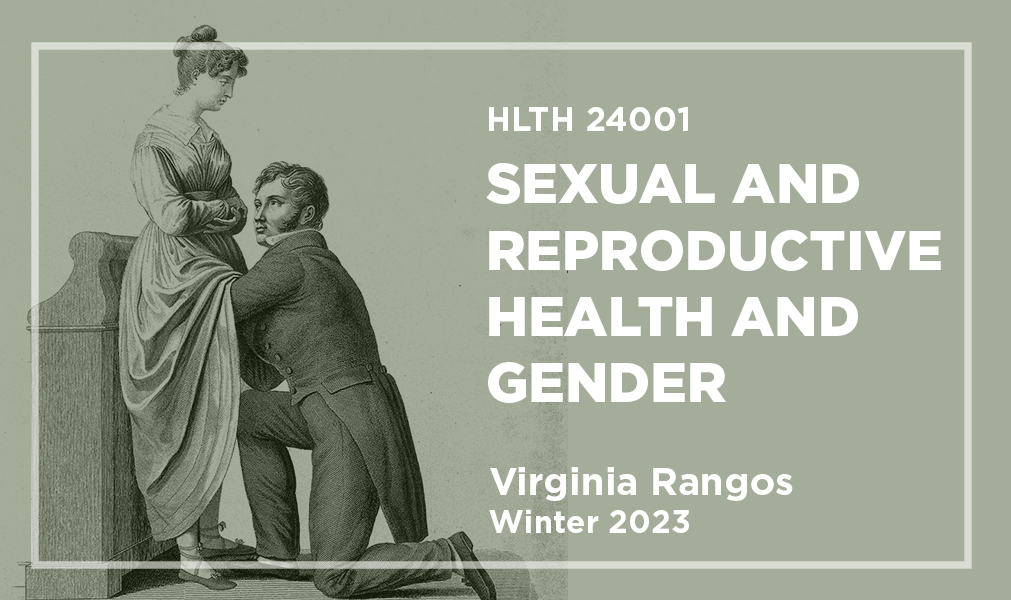Rangos hopes that students will come to this course with an open mind to rethink how we approach sexual and reproductive health.
An Interview With Virginia Rangos
by Jaden Rismay
Dr. Virginia Rangos is a teaching fellow at the University of Chicago. In Winter Quarter 2023, Rangos will teach Sexual and Reproductive Health and Gender for the Health and Society minor.
This course explores how the experiences of reproduction and sexuality have become medicalized, and how people have grappled with these experiences throughout human history in the context of biological sciences, political regulation, and pop culture. A focus for this course is the medicalization of sexual desire. Through course materials, students will read about what it means to have limited to no sexual desire, and how the notion of asexuality has evolved considerably in recent years. Students will learn from activists and members of the asexual community about the destigmatization of asexuality, and the move away from treating it as something that needs medical intervention. Furthermore, this course will challenge the ideas of scientific consensus throughout history by analyzing various forms of bias within medicine.
Rangos is grateful to have the opportunity to teach a course that aligns with her research pursuits. Her research has helped influence how she will design and teach this course. Rangos’ dissertation investigated how stroke and traumatic brain injury patients go about reconstructing their sense of identity in the aftermath of these injuries, including their ability to fulfill goals and relationships, and their ability to embody certain ideals that they have. Rangos spent a considerable amount of time observing patient recovery and return to their routines and to their idea of normalcy— division of labor in the household, sense of independence, and contribution to family life. This research has helped inform her for this course by giving her a strong sense about what is fundamentally important to people, and learning to approach her field work without preconceived notions or expectations. As a result, Rangos hopes that students will come to this course with an open mind to rethink how we approach sexual and reproductive health.
The course will also explore the differences in how we think about reproductive health depending on scientific or social consensus. Students will learn about how one’s ability to be pregnant is not only viewed as the health of that individual, but also the health of a potential fetus. One of the course materials, The Zero Trimester by Miranda R. Waggoner, further explores this concept. The pregnant woman’s body is thought of as primarily a fetal environment in some settings. Consequently, pregnant women are faced with a certain tension between seeking out pleasureful or self-fulfilling things and medically necessary procedures, or solely being thought of as a vessel for another entity. Within abortion debates and policing of pregnant bodies, there are also situations where women are depressed and are on medication—who do you prioritize, the woman or the baby? Do we extend this to think about all people who could potentially become pregnant as permanently being “pre-pregnant”? Do we view someone who is taking drugs as someone who is jeopardizing the fetal environment?
Rangos is excited about a few new texts that have been sent to her, and will be incorporating them into her syllabus. There are too many topic areas for her to cover, but some of the books on the syllabus include:
- Bridges, Khiara. Reproducing Race: An Ethnography of Pregnancy as a Site of Racialization, 2011.
- Littlejohn, Krystale E. Just Get on the Pill: The Uneven Burden of Reproductive Politics, 2021.
- Sufrin, Carolyn. Jailcare: Finding the Safety Net for Women behind Bars, 2017.
- Waggoner, Miranda R. The Zero Trimester: Pre-Pregnancy Care and the Politics of Reproductive Risk, 2017.
Rangos is excited to see lots of students come from a variety of different backgrounds and disciplinary perspectives. This class, and the health and society minor in general, is open and friendly to all majors. Rangos looks forward to the class being diverse in thought which always makes fascinating class discussions.

A vintage advertisement for Lysol feminine hygiene products. “These ads aren’t frightening women into thinking their genitals smell badly. According to historian Andrea Tone, “feminine hygiene” was a euphemism. Birth control was illegal in the U.S. until 1965 (for married couples) and 1972 (for single people). These Lysol ads are actually for contraception. The campaign made Lysol the best-selling method of contraception during the Great Depression.”
Magazine, Smithsonian, and Rose Eveleth. “Lysol’s Vintage Ads Subtly Pushed Women to Use Its Disinfectant as Birth Control.” Smithsonian Magazine.
Sexual and Reproductive Health and Gender
Instructor: Virginia Rangos
HLTH 24001 (GNSE 12118; HIPS 24001; SOCI 20570)
This course will cover topics related to medicine, gender, and sexuality, including: the medicalization of sexual desire and performance; medical, sociocultural, and public health responses to sexually transmitted infections; caring for and criminalizing pregnant (and potentially) pregnant bodies; commodification of reproduction and markets in reproductive materials; and the medicalization of gender and the history and sociology of gender confirming treatment. We will primarily focus on medical cultures in the United States, but will draw on counter-examples from other countries. The readings will approach the material through an intersectional lens.
